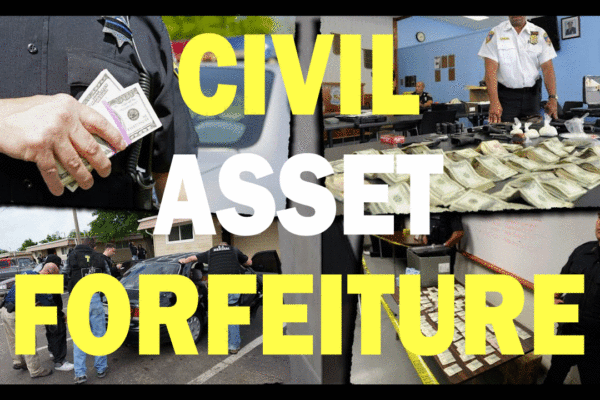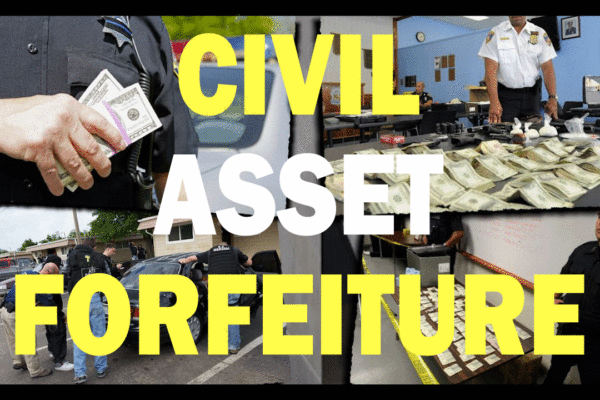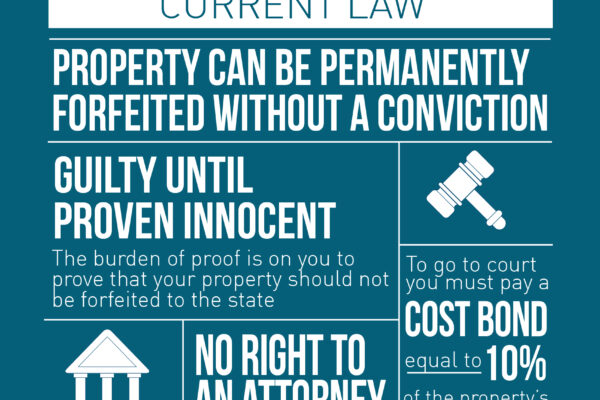

Civil Asset Forfeiture
By completing this form, I agree to receive occasional emails per the terms of the ACLU’s privacy statement.
Last updated on August 26, 2025
Civil Asset Forfeiture
Civil asset forfeiture laws allow the police to seize property that they suspect is involved in illegal activity. But these laws do not require that a person be convicted – or even charged – with a crime in order to lose their property permanently.
Did you know that your property can be permanently taken away by the government even if you are never charged with a crime? Every year, tens of millions of dollars in cash, cars, and even homes are taken from Illinois residents through a practice called civil asset forfeiture.
Civil asset forfeiture laws allow the police to seize property that they suspect is involved in illegal activity. But these laws do not require that a person be convicted – or even charged – with a crime in order to lose their property permanently.
Once the police seize property, the owner won’t get it back unless they successfully oppose the government in court—often without the assistance of a lawyer. Not surprisingly, many people in this situation simply give up and lose their property rather than spending additional resources to fight what is so often a losing battle.
Civil asset forfeiture laws also incentivize the police to seize more and more property, because law enforcement agencies and prosecutors’ offices are allowed to keep most of the money and property they extract from people through this practice. Law enforcement agencies have used the proceeds from civil asset forfeiture as an alternative funding source to pay for travel, entertainment, vehicles, military-style weapons, and powerful surveillance technologies, effectively sidestepping the regular budget process through which elected leaders set spending priorities.
The ACLU of Illinois believes that no person should lose their property if they have not been convicted of a crime, and that police should never benefit financially from seizing people’s property. We are defending Illinois citizens’ property rights by fighting to reform the State’s asset forfeiture laws.
A 2018 law championed by the ACLU reformed Illinois’ civil asset forfeiture laws to promote fairness—including eliminating the requirement that a property owner must pay a bond before being allowed their day in court, and requiring the government to meet a higher standard of proof in order to forfeit property instead of placing the burden on the property owner to prove their innocence. The 2018 reforms also improved transparency by requiring law enforcement entities to collect and publicly report data around the use of civil asset forfeiture in Illinois. In 2025, we again worked with legislators to pass legislation to make necessary improvements to the system of collecting and reporting data about civil asset forfeiture cases, in order to assess how the 2018 reforms are working and whether further policy changes are needed.
As more and better data creates a clearer picture of how, where, and against whom civil asset forfeiture is being used across Illinois, it will be important that state and local elected officials scrutinize the data and stand ready to enact further reforms to protect property rights and curtail “policing for profit.”
- Watch a video from Last Week Tonight with John Oliver: Civil Forfeiture
- Download the report from the Institute for Justice: Policing for Profit (PDF)
- Illinois Policy Institute poll: Robust support for criminal-justice reform (see page 22)
Related Issues
Related Content

- Criminal Legal Systems and Policing
House hearing shines light on Illinois’ unfair, inconsistent laws on civil asset forfeiture

- Criminal Legal Systems and Policing
Report calls for reform of asset forfeiture system in Illinois

- Criminal Legal Systems and Policing

